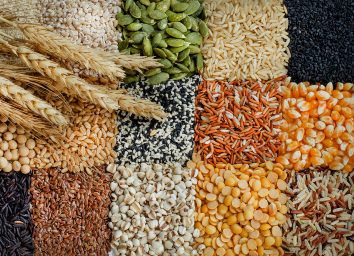10 Signs You Should Get Tested for Celiac Disease

Celiac disease is a hereditary autoimmune disorder—meaning you can't "catch it" from a friend—that disrupts digestion in your small intestine, making it so you can't digest gluten. Gluten is a protein found in wheat, barley, and rye. Over time, if you continue eating gluten-containing foods, the inflammation that results can lead to other medical issues and more serious health complications.
According to the nonprofit Beyond Celiac, an estimated 1 in 133 Americans have Celiac; that's roughly 1 percent of our nation's population. Unfortunately, it's also estimated that roughly 83 percent of Americans who suffer from the disease are undiagnosed or misdiagnosed with other medical conditions.
Celiac disease can be diagnosed, but you might not even be aware that testing for Celiac disease is an option. Before you book that appointment, however, there are some signs you should look out for that might indicate it's a good idea to head to the doc to ask about a gluten-free diet.
If you think you've been experiencing Celiac disease symptoms and suspect you may suffer from the autoimmune disease, these 10 warning signs might be the encouragement you need to get tested.
Fatigue

"Individuals with Celiac disease often have nutritional deficiencies which may contribute to fatigue. Since the small intestine villi tend to blunt or flatten (villous atrophy) and there is an increase in intraepithelial lymphocytes (inflammatory cells) at the intestinal border, the small intestine is not able to absorb nutrients from foods," offers Monisha Bhanote, MD, a triple board-certified physician at Baptist MD Anderson Cancer Center and Yoga Medicine teacher. "The resultant damage can result in maldigestion and malabsorption, and lead to micronutrient deficiency which may ultimately result in the feeling of fatigue and exhaustion."
Diarrhea

"Believe it or not, some people think that having diarrhea is just a normal occurrence. It's not!" cautions Amanda A. Kostro Miller, RD, who serves on the advisory board for Smart Healthy Living. "Normal, healthy stools should be soft, formed and easy to pass. There are countless things that can cause frequent diarrhea, but if you have celiac, you may notice a pattern of diarrhea after gluten-consumption. It is important that you determine the cause of your diarrhea, since diarrhea can be dehydrating!"
Depression and mood swings

One sneaky sign of Celiac disease manifests in the psychological realm: "Gluten intolerance and celiac disease disrupt the composition of normal gut microflora which frequently results in the intestinal overgrowth of Candida albicans (yeast)," explains Alexander Shikhman, MD, PhD, Rheumatologist, and owner of the Institute for Specialized Medicine.
"Candida overgrowth is associated with a massive histamine release, causing allergic reactions and increased permeability of the blood-brain barrier. The blood-brain barrier prevents harmful materials from the blood to enter the brain. The byproducts of metabolizing yeast (for example, ammonia) penetrate into the blood circulation and have a detrimental effect on the brain function causing depression and mood swings."
Of course, depression and mood swings can exist independently of Celiac disease, but if you suffer from these issues and have other potential symptoms of Celiac disease, it's probably a good idea to get tested.
Iron-deficiency anemia

Anemia refers to blood not having enough healthy red blood cells, the cells that carry oxygen to your body's tissues. Indeed, iron deficiency anemia means you're not getting enough iron-rich foods as the cause of this common condition. "Anemia is often blown off as many other causes but if you're experiencing chronic anemia that has been treated with supplements with no resolve, it's time to get tested for Celiac," shares Kylene Bogden, RD, cofounder of FWDfuel a blog for athletes with gut issues. "This occurs because gluten consumption changes the bacterial balances in your gut and causes your body to produce less digestive enzymes, therefore you are unable to properly digest and absorb your food."
Bloating

Constantly bloated? Indeed if you suffer from bloating after eating foods containing gluten, it could be a sign of Celiac: "If we take 100 people with this symptom, two will have celiac. The small bowel loses its villi so less of your food is absorbed. That which remains unabsorbed is gleefully feasted upon by your native bacteria," comments Glenn H. Englander, MD, Gastro Group of the Palm Beaches. "That produces gas which causes mild distention and other generalized uneasiness, or bloating."
Difficulty controlling appetite

You may have heard of Ghrelin, the so-called "hunger hormone" that regulates your appetite and is created by specialized cells in your GI tract. "When the stomach is empty, ghrelin is produced. When the stomach is stretched, the production stops. Clinical research demonstrates that both adults and children with celiac disease have disproportionally elevated levels of ghrelin in their blood compared to age-matched healthy hormones. Administration of a gluten free diet results in normalization of ghrelin levels," says Shikhman.
Fat accumulation, coupled with other symptoms, may be a related sign of Celiac disease. "Leptin the 'satiety hormone,' is a hormone made by fat cells that inhibits hunger and appetite. Leptin is opposed by the actions of ghrelin. In obese people, a decreased sensitivity of brain hypothalamic cells to leptin occurs, resulting in an inability to detect satiety despite high fat/energy stores. Recent research data revealed that gluten inhibits the binding of leptin to its receptor at clinically relevant concentrations and induces leptin resistance and obesity."
Frequent nausea and/or vomiting

"We all have felt nauseous for one reason or another, but if it seems consistent (daily, weekly), the nausea (or worse, vomiting) may be a sign that you are eating something that your body cannot digest well," warns Kostro Miller. "If you notice that you feel nauseous after a gluten-containing meal, then you may want to be tested by your doctor for celiac." So you can give your doctor as full a picture of your case as possible, try writing down every time you feel nauseated or throw up and what you ate prior to it so you have a log to show at your appointment.
Infertility

Perhaps surprisingly, fertility-related issues may be associated with gluten intolerance. "Infertility may also be due to malnutrition," says Jason Reich, MD, Gastroenterologist at Southcoast Health, as well as a host of other issues, "but this is less clear and may be an immune-mediated phenomenon." Bogden echoes Reich's sentiment: "We are seeing more and more that infertility is incredibly common with undiagnosed Celiac. It is tricky to know for certain why this it but as healthcare providers, we believe the body is intelligent enough to know it is unable to carry a child when it is under a constant state of autoimmune attack."
So far, the research is mixed on the topic of Celiac disease and infertility, but some studies indicate there's increased difficulty getting pregnant and an increased risk of miscarriage for those with Celiac disease. In some cases, a woman with reproductive issues may have undiagnosed Celiac disease. A diagnosis can be the first step in helping a woman have a live birth pregnancy. Learn more at Beyond Celiac.
Increased risk of fractures

Suffering from decreased bone strength or even suffering from an unexplained fracture? "Chronic inflammatory diseases, including celiac disease, are associated with overproduction of proinflammatory cytokines, which activate osteoclasts and accelerate bone resorption leading to osteoporosis and increasing the risk of osteoporosis-associated fractures," says Shikhman. There are also countless osteoporosis risk factors besides Celiac disease.
An itchy rash

Formally known as Dermatitis Herpetiformis, this rash can be a sign of Celiac disease. "Only about 20% of people with DH have intestinal symptoms of Celiac disease. DH is known as the 'skin version of Celiac disease,' though a high amount of people with DH have damage to the small intestine similar to those with intestinal symptoms of Celiac disease," says Diana Gariglio-Clelland, RD, who has worked in hospital, public health, and primary care settings and now is with Balance One Supplements.








